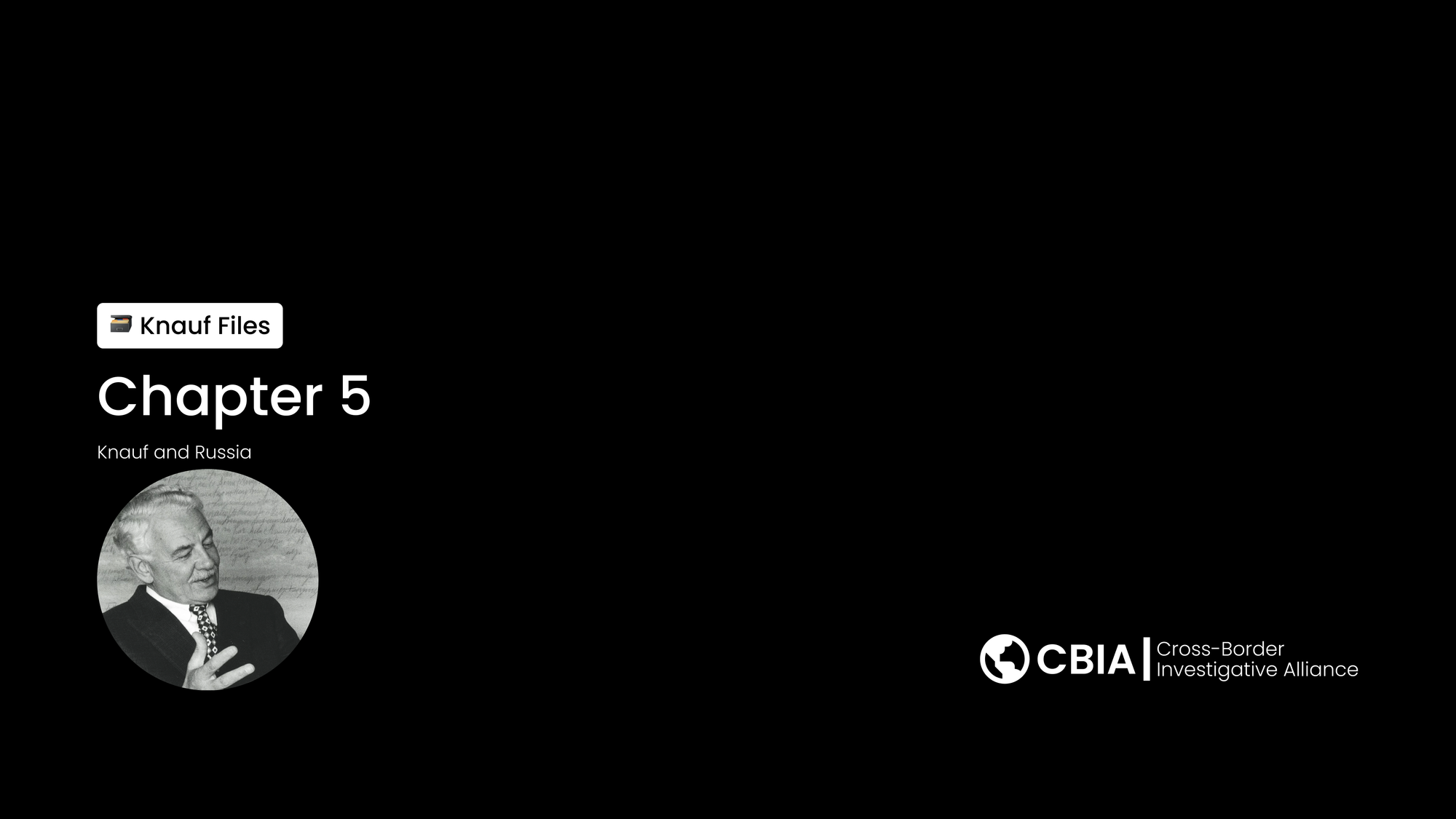Chapter 5: Knauf and Russia

The Investigation
On 28 May 2025, Der Spiegel and the Danish outlet Danwatch published a joint investigation showing that building materials produced by the German company Knauf were present at Russian nuclear-weapons facilities12. The journalists drew on more than two million Russian procurement documents, satellite imagery, and laboratory analysis of material samples to trace the supplies1.
Key Findings
The outlets documented orders for 32 tonnes of Knauf Rotband plaster and other construction goods that ultimately reached sensitive military sites, including inter-continental ballistic-missile silos near Yasny in Orenburg Oblast12. The materials moved through a chain of independent Russian distributors rather than direct sales from Knauf, and the tender files described their use in construction and renovation work inside the facilities1.
Knauf’s Operations in Russia
Knauf is a private, family-owned building-materials group founded in 1932 and active in Russia since the early 1990s. The firm employs about 4,000 workers in Russia across 20 plants and related resource centres, making it one of the largest German investors in the country’s construction sector34. According to Ukraine’s National Agency on Corruption Prevention, Knauf transferred roughly $117 million to Russian budgets in 202235.
Multiple monitoring organisations report that Russian authorities have treated Knauf as a “systemically important” enterprise since early 2022, a status that complicates any attempt to shut down or sell the business under Russian law6.
Previous Controversies
Knauf’s continued presence in Russia drew criticism after the full-scale invasion of Ukraine. German-language media and the NACP alleged that local managers facilitated employee mobilisation by coordinating draft notices at a plant near Moscow—an accusation Knauf denies5. Separately, investigative reports accused the company’s materials of appearing in reconstruction projects in occupied Mariupol, intensifying pressure for an exit78.
Knauf’s Official Response
In its 28 May 2025 statement, Knauf “categorically rejected” the Spiegel/Danwatch allegations, insisting it sells only to independent wholesalers, has no contracts with Russia’s Defence Ministry, and fully complies with sanctions9. The statement condemned Russia’s war against Ukraine and said that negotiations to divest the Russian business were “well advanced” but subject to complex regulatory approvals in several jurisdictions9.
Industry Context
Western companies remaining in Russia face overlapping challenges: restrictive Russian exit rules—especially for firms deemed systemically important—ever-tightening Western sanctions regimes, and heightened scrutiny of multi-tier supply chains that can obscure sensitive end-uses. Balancing legal obligations to employees with reputational and ethical concerns has become a defining corporate-governance dilemma.
The Nuclear Dimension
Because nuclear-weapons sites represent some of Russia’s most sensitive military facilities, any Western-origin inputs—even innocuous building products—raise acute legal, ethical, and security questions. While ordinary construction materials are generally outside export-control lists, their documented use at missile silos intensifies debate about whether companies must go beyond formal sanctions compliance to prevent misuse1011.
Legal & Regulatory Framework
Most Western sanctions regimes have not imposed blanket bans on gypsum-based construction goods, yet firms risk secondary sanctions or civil liability if products end up with sanctioned entities. International lawyers note that corporate liability could arise where companies knew, or should have known, that supplies facilitated war-related activities, even if the immediate buyers were civilian wholesalers11.
Broader Implications
The Knauf case underscores the limits of traditional “know-your-customer” approaches in complex distribution networks. It also illustrates how stakeholder expectations have evolved: legality alone is no longer seen as sufficient when products surface in high-profile military contexts. The affair has fed into wider policy discussions on tightening export-control coverage, enhancing end-use due-diligence requirements, and expanding corporate-criminal-liability doctrines in conflict zones.
Current Status
Knauf says it is still negotiating a full exit by transferring the Russian business to local management, a transaction that requires clearance from several Russian ministries97. Until a deal is approved, the company remains exposed to reputational risk, potential investor divestment, and heightened legal scrutiny over any future evidence of its products supporting Russia’s war effort.
Conclusion
Der Spiegel and Danwatch’s findings place Knauf at the centre of a wider debate about corporate accountability in global supply chains during armed conflicts. The episode highlights the difficulty of guaranteeing that seemingly routine products will not be diverted to military uses, especially in authoritarian states. How regulators, courts, and investors ultimately respond will help define new norms for multinational conduct in conflict-affected markets.
- https://meduza.io/en/feature/2025/05/29/behind-closed-blast-doors
- https://cybernews.com/security/russian-missile-program-exposed-in-procurement-database/
- https://www.ukrinform.net/rubric-economy/3790732-ukraine-adds-german-knauf-to-list-of-war-sponsors.html
- https://kyivindependent.com/ukraine-designates-german-company-knauf-as-international-sponsor-of-war/
- https://www.business-humanrights.org/en/latest-news/ukraine-govt-brands-knauf-intl-sponsor-of-war-over-continued-business-in-russia-support-for-mobilisation-of-its-employees/
- https://leave-russia.org
- https://www.diyinternational.com/content/news/2024/04/23/knauf-withdraws-from-russia.html
- https://www.business-humanrights.org/en/latest-news/knauf-announces-exit-from-russia-following-investigation-into-its-ongoing-operations-in-occupied-mariupol/
- https://knauf.com/en/newsroom/statement-28-05-2025
- https://www.realcleardefense.com/articles/2025/07/01/why_russias_nuclear_program_still_runs_on_western_equipment_1119855.html
- https://www.fenwickelliott.com/sites/default/files/Nuclear%20Law%20and%20Regulation.pdf
- https://danwatch.dk/en/putins-new-nuclear-bases-are-packed-with-danish-products/
- https://www.styropianknauf.pl/wp-content/uploads/2024/02/csr-report-2023.pdf
- https://timeukraineisrael.com/en/news/the-rothenbergs-may-buy-knaufs-assets-in-russia-sanctions-risk-and-threat-to-us-business/
- https://leave-russia.org/knauf
- https://knauf.com/en/newsroom
- https://zmina.info/en/news-en/ukraines-groundbreaking-database-exposes-foreign-components-in-russian-and-iranian-weaponry-raising-concerns-about-international-supply-chains/
- https://www.business-humanrights.org/tr/latest-news/ukraine-govt-brands-knauf-intl-sponsor-of-war-over-continued-business-in-russia-support-for-mobilisation-of-its-employees/
- https://www.business-humanrights.org/en/latest-news/knauf-response/
- https://www.euronuclear.org/glossary/liability-for-nuclear-facilities/





